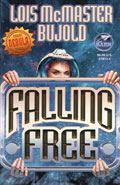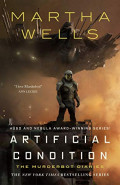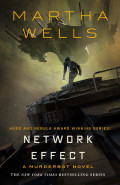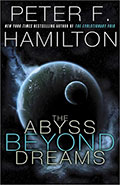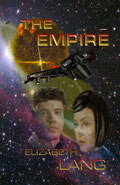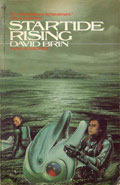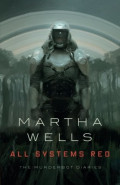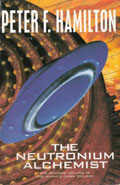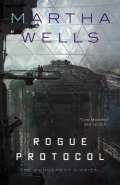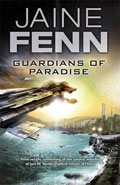A Closed and Common Orbit
By Becky Chambers
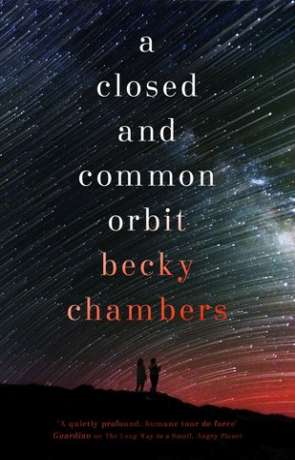
- A Closed and Common Orbit
-
Author: Becky Chambers
-
Publisher: Voyager
- ISBN: 978-1473621442
- Published: October 2016
- Pages: 464
- Format reviewed: Paperback
- Review date: 23/02/2017
- Language: English
A Book that brings you Home: Becky Chambers’ A Close and Common Orbit.
It took me a while to work up the emotional energy to read Becky Chambers’ A Close and Common Orbit. This is Chambers’ second novel. Her first novel, A Long Way to a Small Angry Planet, was a unique self-published sci-fi novel that blew up in popularity. It made it onto the lists for several awards, including the shortlist for the Arthur C Clarke Award and the longlist for the Baileys Women's Prize for Fiction. It garnered enough commercial and critical success that Chambers was picked up by the publisher Hodder and Stoughton. A Long Way to a Small and Angry Planet was a fantastic and emotionally engaging novel. It had a profound impact on me, and so I knew Chamber’s second novel would as well. When preparing to read A Closed and Common Orbit, I expected, as with Chambers’ first book, that I would cry (I did), and that by the end, I would be left simultaneously enraptured and distraught (I was).
A Closed and Common Orbit is set in the same beautifully crafted universe as Chambers’ first novel, but the plot is almost completely separate. It follows the paths of two relatively minor characters introduced in the first novel. Sidra is an newly conscious artificial intelligence, built for a ship but now inhabiting an artificial human body so well crafted that no one suspects she’s anything other than truly human. She is guided by her friend and at-times mentor in things human, Pepper, a friendly expert engineer who - as we learn in the first chapter- was herself raised by an artificial intelligence. The story swaps between Pepper’s past and Sidra’s present. In the past, Pepper struggles to grow and survive in a hostile world with an artificial intelligence taking the role of confidant, advisor and, in some ways, parent. In the present, Pepper takes on a similar role- though with less parental overtones- for Sidra. Out of place, Sidra struggles with her body, her identity, and her relationships. She tries to find a place in a world that doesn’t see artificial intelligences as fully sentient beings, and tries to find peace in a body that she cannot help but feel does not belong to her.
Chamber’s universe is a complex one, and while you don’t need to read the first book to understand the plot of the second, a reader new to Chambers’ universe might find themselves adrift among the alien species, cultures, technologies and worlds that populate the text. Once you can make sense of it all, though, the intricacies of the universe are compelling. While most of the main characters are humans (or at least AIs pretending to be human),members of alien species play major roles as well, and they add beautifully to the novel. Chambers has created truly fascinating alien cultures, cultures which often force us to look a bit more closely at elements of our own world,and learning about these cultures throughout book is an intriguing and enjoyable experience. In truth, the plot sometimes felt like the weakest part of the novel; there weren’t many moments of tension or active conflict, and the resolutions to certain conflicts felt unfulfilling. This isn’t to say the plot is bad; it just isn’t what makes the book great. This isn’t a book that grabs you with its breakneck pacing and clever twists. The plot is not an end in itself as much as a vehicle through which to develop the characters, and it is characters where Chambers truly shines shines.
The characters and their interactions are what make what makes A Closed and Common Orbit a truly beautiful novel. Sidra, Pepper and the major non-point of view characters are carefully and compassionately crafted. Their relationships with each other aren’t always easy; where the story really moves forward is not outside conflict but the conflicts between these characters. Yet in their conflicts, these characters are extremely sympathetic. They clearly aren’t perfect, but they are still admirable and, above all, they are human (even as they are also Artificial Intelligences and aliens, they give us profound insight into the human condition). These characters are compassionate, complex, flawed, and relentlessly real. Particularly in sci-fi and fantasy, we often talk about more “realistic” characters in reference to the trend towards gritty, dark fiction. When we refer to “real” characters we often mean morally gray protagonists, or sometimes outright anti-heroes, who are generally really good at killing other people, be it with swords, magic, guns or lasers. These characters and the narratives around them often make us come face-to-face with difficult questions, and they’re also usually vastly entertaining. I love these types of characters, and I love these types of stories. But I think Chambers has a different type of “realistic” character which is equally engaging. She writes about people who are flawed, difficult, who make mistakes and do the wrong things; people with biases, who fight and hurt each other, who snap and lash out; but for all that, she writes about fundamentally good people, people who grow and love and help each other, and people who try to do the right thing even if they don’t always succeed.
There is a type of grief that comes at the end of certain stories, the kinds of stories you don’t want to end. It isn’t grief come from the end of the narrative itself- a good plot, no matter how gripping, is not the part of a novel that makes us invest emotionally. More often than not, we don’t want to the story to end because the characters are so inviting and loveable, the world so fascinating and engaging, that we don’t want to leave the people and the places we have come to love. In A Closed and Common Orbit, a surprisingly significant portion of the novel revolves around seemingly inconsequential issues.
One major plot point is one character's’ decision to get a tattoo. This isn’t a part of the plot that creates suspense and action, but it is still engaging because of how it shows the complexity and growth of the characters. When the characters talk about tattoos, or their love of certain drinks, or any other number of day-to-day topics, the conversations are interesting because they show the intricacies of Chambers’ world, and because they they give the opportunity for the characters to interact and for their unique personalities to shine. Seemingly casual moments like this fill the book, made profound and engaging by the depth of the characters. If I could, I would be happy to sit for a long time, watching the lives and conversations of the characters Chambers has made, the bustle of the universe she’s created, and, for a moment, feeling a part of it all. What I feel when I read a novel by Chambers is a feeling of home; a home I do not want to leave when the novel ends.
If, in the end, A Closed and Common Orbit left me slightly emotionally battered, it was for all the right reasons; like departing a good friend, leaving behind this book is bitter-sweet.
Written on 23rd February 2017 by Sean Connolly.
